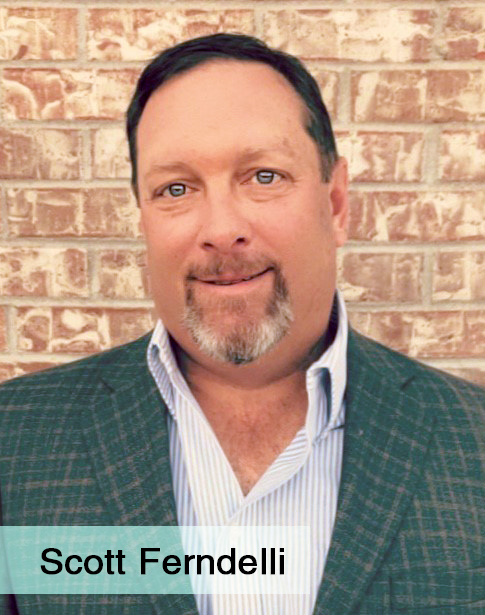
Hello and welcome to our July edition of The Juicy Stuff: An Interview Series with Our Board Members. Each month throughout 2019, I will be interviewing one of our board members and publishing it to our blog, right here. The interview is a mix of strategic questions as well as surprise questions to keep things entertaining.
 This month, I interviewed Mr. Scott Ferndelli, CEO of $141M Arapahoe Credit Union in Littleton, CO. Scott has been in the credit union movement for over 25 years and has been on our board since 2017.
This month, I interviewed Mr. Scott Ferndelli, CEO of $141M Arapahoe Credit Union in Littleton, CO. Scott has been in the credit union movement for over 25 years and has been on our board since 2017.
I am excited because it’s finally summer. The sun is shining hot and strong. The fourth of July is tomorrow. I take a drive down to Scott’s new administrative building on Broadway and Arapahoe. After a thorough tour of the facility, I can see the care and attention to detail that went into making this building comfortable for Scott’s team. There is a gym, a remodeled shower, canvas art wrapped over sound-proofing foam (to help with the echo, Scott says), a sun-dappled breakroom next to a pond, and a chocolate fountain with stocked with organic strawberries. The fountain part isn’t true, but you get the point.
What are your credit union’s goals for 2019?
Scott Ferndelli: Our biggest goal this year is to manage our balance sheet. Last year, we experienced significant growth in both loans and deposits. A perfect storm came together and our loans grew nearly 30% in 2018. About halfway through the year, we said, “Wait, we need to bring in some deposits to fund these loans!” We did just that – we raised our CD rates and were able to bring in a significant amount of member money pretty quickly. By the end of 2018, we had grown deposits over 20%. But we outgrew our capital position. This year the big goal is no growth – which is kind of a weird place to be.
In the previous four years, we kept asking, “What can we do to get loans in the books?” We changed our underwriting standards but nothing was working, and then all of a sudden, boom! Maybe it was new products, maybe consumer confidence, but whatever it was, loans just took off. It was a good problem to have.
A second goal has been improving infrastructure, improving our network, and upgrading our technology for security and efficiency. We’re doing a core system search this year, knowing that we have to select one that is relevant, but realistically priced. There are some great cores out there, but a big concern for us is selecting one that has more functions than we actually need and paying for it, and also not spending more than we can actually utilize for the size of our credit union.
The biggest problem is that with the limited staff that we have, I can’t just go hire 30 people and say, “Go choose me a core.” It’s bringing in all the executives and all the different critical functions of the credit union and having them sit in days-long presentations. It takes them away from the members. It’s something we have to do, knowing that the outcome will benefit us in the long run, but it sure is a resource stealer.
But I feel good and know we will make the best selection for our credit union, the staff, and the membership.
What are you always curious to learn more about?
SF: How things work from a mechanical standpoint. Something’s wrong with the garage door…I want to be able to know how to fix it. I find myself utilizing YouTube to determine how things work and how to repair them. I like to tinker.
AD: There is a show called How It’s Made. You’ve heard of that show?
SF: Oh yeah. I love that show. My willingness to explore usually works out for me. But I have a good example just recently where it didn’t. My wife comes to me and says, “Hey, the oven door is kind of flapping.” The front stainless-steel panel had been disconnected somehow, which is secured with double-sided tape. I see that I just need to take off this bracket to replace the tape. So I take off this bracket, and before I know it all the glass falls out of the door…just shatters. You probably don’t realize it but there are four pieces of glass in an oven door. Four panes of glass fall to the floor and shatter. My wife was just standing there asking why I didn’t just call a guy.
What I thought was replacing some double-sided tape on the oven door for maybe 20 bucks turns into a thousand-dollar repair of an oven door. That’s my willingness to understand how things work and take them apart and repair them. It has served me well, mostly. And this is one example where I should’ve called the experts and let them handle it.
What was challenging for you last year, as a credit union CEO?
SF: I have a couple items – first was opening our administration facility. I’ve opened/remodeled several buildings for credit unions, and this was really the first time that finding quality subcontractors was a big challenge. Now, if you can get a subcontractor to bid, most of the time the bids tell you they don’t really want the work, like the pricepoint is three times too high. Finally, when you get a bid that’s a reasonably priced,finding contractors to do the work properly is truly difficult. It’s a lot of sitting there and twiddling your thumbs waiting for people to get back to you.
That’s just how it is in this booming Colorado construction industry. We’ve been in this building a year and I’m still calling different contractors to come in and repair poor quality workmanship. And timelines are problematic…I’d say to anyone who is building, “Double your timeframe and add a lot to your budget.” It’s difficult, and maybe it’s more difficult for a smaller credit union building only a 10,000 square foot building.
The second item, which we’ve alluded to, was NOT growing the credit union. Imagine going to the marketing department and saying, “I need this [campaign] to be relevant. I need it to have exposure to our membership, and I need you to explain and communicate the value of our credit union. Oh, by the way, don’t grow loans and don’t grow deposits.” You get the deer in the headlights look. So we promote delivery channels, our community presence and security awareness. For years now, we’ve been doing a shred-a-thon in association with the schools. It’s a fundraiser and the donations go to the schools. It gives us an opportunity to talk about member privacy and security.
 My marketing team has done a very nice job in developing a different value than just our basic products. I think it has been a challenging year in learning how to communicate those values to the membership without growth goals as part of the equation.
My marketing team has done a very nice job in developing a different value than just our basic products. I think it has been a challenging year in learning how to communicate those values to the membership without growth goals as part of the equation.
What is something that you do that your staff wishes you didn’t?
SF: …Something I do that my staff wishes I didn’t. [long pause] It probably would be my sarcasm. I wish I could call them in and ask what they think!
AD: You can always get back with me. You could send out a survey.
SF: [laughs] I’m going with it. It’s dealing with my sarcasm. Here’s an example: one of my staff members is presenting at a meeting and I ask a question that the presenter knows I know the answer to. I feed them questions that will get them to talk about specific points I know the room needs to hear, and sometimes it throws them out of sync. I also will be sarcastic and try to be funny and I’m not always on-point. I find myself funny, but I don’t think my staff always agrees.
You are sitting in front of the TV, what are you watching?
SF: Colorado Sports. I’m watching the Colorado Rockies. I’ve watched more baseball in the last two years than I have in my entire life prior. I have an 11-year-old son who’s getting into baseball and is pretty talented, so now I’m becoming very aware of the intricacies of the game: batting, pitching, fielding and so on. I’ve really become an avid Rockies fan and appreciating it much more than ever. But I also watch the Avalanche, the Broncos, the Nuggets, even the Rapids.
Or old movies. I still love my movies from the 80s and I’m one of the people that can watch a movie over and over again and still enjoy them. My wife says that I’m senile and dementia is setting in.
And maybe it’s because I don’t have to focus on it. I know what’s happening and I can let it entertain me but also just zone out.
What changes have surprised you most in the credit union industry throughout the years – something you never expected to happen?
SF: I’ll try to frame it this way: back in 1994 when I first started in credit unions as a controller, I received the first PC that the credit ever had. Did I ever think that big tech – Facebook, Google, the big retailers or Amazon – were going be a competitor with credit unions? I don’t think I could have pictured that technology would have taken us to where Apple thinks that they can be a better financial institution than banks and credit unions.
 Technology created a different competitive environment for credit unions – that’s something I never could have seen. If we are not partnering with these companies and trying to figure out how to make them still use our debit card in their app, we’re going to be more challenged than ever. I’ve gone from getting the first PC, to having an iPhone that has to do everything I need from a banking standpoint. I think the next five years will move faster than the last 25. And that’s scary, with crypto currencies, and a different competitive environment than I could have ever expected.
Technology created a different competitive environment for credit unions – that’s something I never could have seen. If we are not partnering with these companies and trying to figure out how to make them still use our debit card in their app, we’re going to be more challenged than ever. I’ve gone from getting the first PC, to having an iPhone that has to do everything I need from a banking standpoint. I think the next five years will move faster than the last 25. And that’s scary, with crypto currencies, and a different competitive environment than I could have ever expected.
I think I could have seen that technology would provide solutions. I don’t think I could have imagined that technology would provide different industries that now have the ability to compete with us.
If you had a time machine, would you go back in time or visit the future? What year would you go to?
SF: If I had a time machine I would go into the future to understand how I could help [my kids] become better and what would make me a better parent today. As a parent, every single day I question my actions; I don’t know if what I said is causing trauma, or if it’s inspiring them to be better, if I’m too hard or easy on them. I would want to travel forward, learn my mistakes and then try to improve those mistakes today.
AD: Of anything you could have chosen, that’s very selfless.
SF: One of my favorite quotes that I tell everybody here is don’t live to work, work to live. We come to this office, but that right there is what is important [pointing to propped up iPad with video stream of his living room]. I definitely would want to go forward. Learn how to be a better parent and come back and make those changes.
There is a new wave of credit union decision makers on the horizon. What advice would you give them?
SF: This one I feel really passionate about and I really try to live this philosophy: employees are your #1 resource and young decision makers need to realize this. You can’t get the job done without them. Your employees can make you look good or bad, so hire quality staff and treat them well. That is absolutely imperative.
You should hire people that fill your weaknesses and not your strengths. But Steve Jobs said it better in this quote: “It doesn’t make sense to hire smart people so you can tell them what to do. We hire smart people so they can tell us what to do.” Hire your weaknesses because then you have a good combination.
I think it is hard for a young manager or decision maker to overcome that insecurity of not knowing more than their staff. Give staff 100% of the credit and you take 100% of the blame. I really try to live by that. If an employee makes a mistake, they will know that you’ve got their back, that you won’t throw them under the bus. We’re a credit union. There’s no mistake we can make that can’t be fixed. We’re not heart surgeons.
You also have to give your employees what they need to get the job done. As a manager, that’s what your job function is. And that’s hard. I will say that’s been one of the hardest things about becoming a CEO from the CFO. I used to just get in there and do it myself, vs. now making sure that my professionals can make those decisions to do those things themselves. I have to give them the tools and empower them to be able to do that.
Another piece of advice I’d give is to create a comfortable culture for your own credit union. As I’m sitting here in golf shirt, shorts and sandals, I might be the only person you interview that has this attire on.
And if you walk through the branch and you’ll see all staff is dressed casually. Our membership is primarily educators, and this is how they’re dressed. We’ve made the conscious decision to dress just like them. Let’s not create an intimidating environment where we dress like bankers and there is an atmosphere of “I know more about this than you do.” That’s not it. We’re a partner and our dress code is to portray to our members that, “Hey, we’re with you. We do have financial expertise and let’s help you make the best decision.” We take our job seriously but we try not to take ourselves too seriously and that’s important.
Now I struggle when I go to the CUSN annual meeting and I’ve got to put on a pair of pants. Are you kidding me?
What could you spend all day doing?
SF: Golf
AD: There was absolutely zero hesitation with that answer.
SF: Green is my favorite color because it brings me to the golf course. I love golfing because it takes me to the nicest places in the country. It’s challenging. It can be done with friends and family. I like golf because I know I can have a beer and play golf at the same time.
Golf is my challenge and my getaway. I’m willing to get up early for it – I have a tee time tomorrow at 6:20am, which means I probably have to get up at 4am to gather my other player and get to the golf course. It is my sanctuary.
AD: What are your top 3 favorite courses around the country? Because I am sure there are other golfers reading this article.
SF: Wow. It’s hard to say. Some people like iconic courses like Pebble Beach. I will play those, but right now I’m not at the point where I’m going to pay $700 or $800 for a round of golf. Out in Palm Springs – PGA West is one of my favorite places.  The course is amazing but extremely difficult. The next one is going to be The Boulders out in Arizona. There are rocks that you don’t know how they are balancing on themselves. You’re teeing off underneath this thing and thinking, “Well it could fall on me at any time.”
The course is amazing but extremely difficult. The next one is going to be The Boulders out in Arizona. There are rocks that you don’t know how they are balancing on themselves. You’re teeing off underneath this thing and thinking, “Well it could fall on me at any time.”
 For a Colorado course, I must say the course at Steamboat. You always see wildlife on it. Just the quality of the scenery and the atmosphere is wonderful.
For a Colorado course, I must say the course at Steamboat. You always see wildlife on it. Just the quality of the scenery and the atmosphere is wonderful.
 Tell me your thoughts on the future of credit unions.
Tell me your thoughts on the future of credit unions.
SF: Tough one. Credit unions have a good mission and purpose: to be the best financial institution for the membership. That is what will keep us going. If we keep that priority, then we will continue to succeed and differentiate ourselves from other institutions.
If profitability and growth become our primary focus, we will dilute our value and we will become our competitors. It’s really challenging because we have to be profitable and keep growing. If you’re not growing, you are dying, but we cannot lose sight of our priority – to be the best we can be for the member.
But that’s the perspective from a small credit union CEO. Maybe growth and profitability are not my priority because I know I can serve my members better than anybody else, because I know them better than anybody else. Knowing your member, their wants, needs, experiences and frustrations will help us succeed. I think that’s what keeps the industry alive and thriving.
Ad: It’s getting more blurred though.
SF: And I understand that. Consolidation is still going to happen within the industry. And it used to be that a $10M credit union was pretty small. Now is $50M pretty small? Or my credit union at $140M?
Many credit unions are going to consolidate because they can’t compete with technology and other things like that. We’re going to need to make sure we have valued partnerships. We need to be more cooperative than ever before, especially the small credit unions. If we can be cooperative, we can still serve our members better than anybody else.
Credit unions are going to be relevant in the future. Let’s just keep our purpose and our vision.


 Tell me your thoughts on the future of credit unions.
Tell me your thoughts on the future of credit unions.

